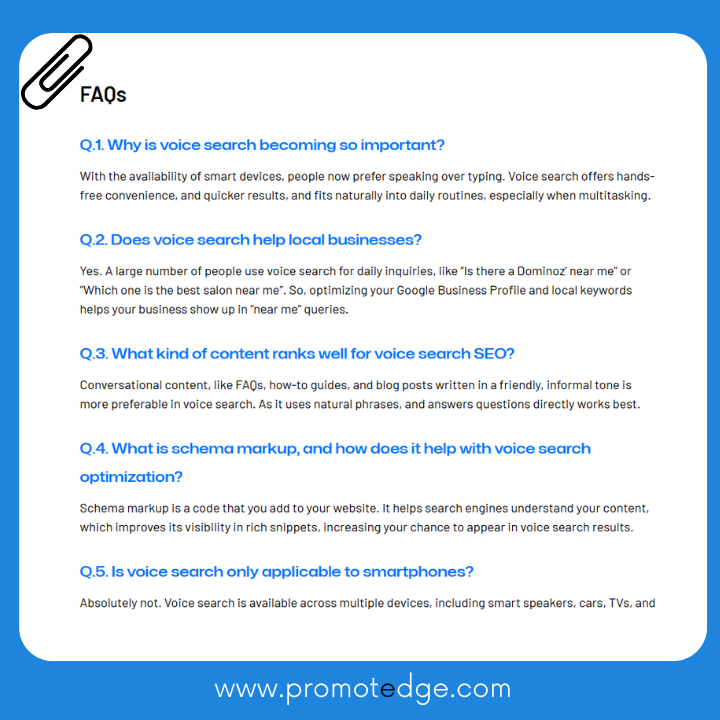
-
Author: PromotEdge
-
Updated Date: Jul-08-2025
-
Views: 2 Min Read
Technology has progressed rapidly over the years. Even a few years ago, it was so hard to use voice commands for simple research. But with time, it now has become an integral part of our daily lives. With Google, Alexa, and Siri ready to answer every question and command, it’s time for businesses to focus on voice search SEO.
Smart devices are everywhere, and it’s time for businesses to opt for smart strategies. If you want your website to be on top, you can’t just rely on text search. Your content needs to be optimized to meet the complexities of voice search.
Let’s say a user is cooking or washing dishes and suddenly they have a query. It can be anything. For example “How can I keep my paneer softer when cooking” or “What is the name of the song that starts with ‘the music’”. Data suggests that over 70 percent of Indian users used voice assistants to play music. And with time the popularity of voice search has only increased.
People do random voice searches. It is not like when they are typing on their device. Even when searching for technical information like “Which TMT bar do you suggest for building a 2-storey house”, the questions are longer and more informative.
In this article, we are exploring voice search optimization, its benefits, and how you can creatively integrate it into your website.
What is Voice Search Optimization (voice search SEO)?
We can categorize voice-enabled commands into two segments: voice search and voice commerce. In the first one, people use voice commands to access information, while in the latter they use it to make a purchase.
Regardless, brands need to implement creative SEO techniques and content to appear on top of the search results. Brands also must consider the technical aspect of SEO as well. People use different devices for voice searches, including smartphones, smart speakers, TVs, and even cars, using built-in assistants like Siri, Google Assistant, and Bixby.
In the business world, the end game for brands is to grow! To achieve your desired outcome, it is essential to adapt to the emerging technologies. Voice Search optimization helps brands:
- Increase brand visibility
- Improve user experience
- Attracts high traffic
- Enhance content reach
- Build brand authenticity and trust.
So, how does voice search work?
During voice search, the user has to ask the question or queries out loud, rather than typing them. Smart speakers and other virtual assistants are changing the way we live and of course, the way we search for queries and information online. Just for example, if you ask ‘best SEO agencies in Kolkata’, your voice search-enabled device will show you the results. Many reports have predicted that more than half of all searches will be done via voices in the next few years. In 2016, Google CEO Sundar Pichai announced that around 20% of mobile searches were via voice.
Voice search is an effective method to use when the users are busy and are not able to look at their phones. During that time all they have to do is just ask the question loudly to their device.
Browsing has now become more convenient than ever and for digital marketers and SEO companies in Kolkata and other major cities of India, voice searches are changing the way to approach SEO.
Impact on SEO:
Digital marketers will know that Google changes its search algorithm more than 500 times in a year and it is quite obvious that these changes affect search results and SEO strategies. Voice search also impacts SEO. Virtual assistants like Alexa and Siri, answers to your queries with a short and compact sentence, usually from a news source.
Voice searches are made to give the most relevant search results to the users. So, in order to get a website or information noticed, SEO agencies in Kolkata and other major cities of India, have to work on optimization more, keeping in mind the pattern used by voice search.
Digital marketers have to make sure that the content which they are using is conversational and easy to understand. It will be helpful because it meets the pattern of voice search. Blogging will always be a pivotal part of making voice search successful.
Here is how you can optimize your site or write up for voice search
Interrogative statements –
It is essential to make use of interrogative statements. These are the type of short queries that start with what, where, how and why. As the users are looking for quick responses to their queries, the query will be in a conversational way.
Devices –
As per many reports, more than 60% of all searches come from smartphones/mobile devices, and out of that around 20% are using voice search. Make sure that the website content is optimized for mobile devices.
Local SEO and ‘Near me’ strategies –
Local SEO and ‘Near me’ strategies work like wonder for voice search since most of the questions asked via voice are short inquiries. For example – ‘Which is the best restaurant near me?’, ‘Gas station near me’, etc.
Is Voice Search Influencing Consumer Behavior?
Yes, voice search has left a significant impact on consumer behavior. The days of typing a query and waiting minutes for pages to appear are long gone. Consumers now interact with technologies like Alexa, Siri, Google Assistant, Cortana, and Amazon Echo on a day-to-day basis, for searching and shopping.
Let’s take a look at how voice search is leaving an impression on consumers:
Changing Search Habits
The worldwide smart speaker industry is expected to grow by $110 billion by 2033. It shows how people are switching to voice search and voice command options. This evolution demands that businesses need to update their SEO strategies.
Making Purchase Decisions
Voice search has the potential to impact people’s purchase decisions. The technology can help consumers place orders or reorder items with a simple command, making it more convenient. Leading e-commerce platforms in India like Myntra and Flipkart have integrated voice search options in multiple languages to improve user experience.
Higher expectations for faster results
Consumers of the present generation expect fast, accurate answers in real-time. Voice search can meet the expectations, as it is much easier to speak than typing.
How is voice search different from traditional text search?
The way people use search engines has changed after the emergence of voice search. Instead of typing, speaking feels more natural. Hence, the voice search commands are typically longer than text-based search. Here’s an example to clarify:
Text-based search: 2 BHK apartments for rent
Voice Search: Share a list of 2BHK apartments for rent near me
Importance of Voice Search SEO
The digital landscape is highly competitive. Every brand is trying to attract their audience’s attention. Brands can’t dare to neglect any new technologies, or they may fall far behind in the competition.
To become visible to people’s queries, you must pay attention to voice search SEO as much as you do to traditional SEO. Consult with your SEO agency, to create a strategy that can boost your SEO efforts.
Let’s take a look at the importance of voice search SEO for your business:
Drives more traffic to your website
It’s not easy to drive traffic to your website. Especially when your competitors are cooking up to beat you. A study shares that for adults in the US, voice assistants are the most popular feature of AI-powered smartphones. And it is not just the US, Indians are also not far behind in this trend.
In fact, according to Google, India is using voice queries nearly two times more than the rest of the world.
Increases User Experience
Hyper-personalization is the latest marketing in today’s digital world. With multiple tools, marketers can access valuable information on the audience’s information, and preferences, based on demographics, gender, and other factors.
Voice search SEO makes consumer interaction more personalized, convenient, natural, and accessible. Typing a long query can be such a hassle, sometimes. But voice search is much faster and hands-free. By optimizing the website and content, brands can share a more clear and concise answer to customer queries rather than sharing a vague answer.
Be a step ahead of your competitors
Understanding the latest trends gives you a competitive edge. The demand for voice search SEO is on an upward trend. So, implementing it into your SEO strategy can help you stay on top of your competitors in SERP.
How to optimize your website for voice search SEO
Voice search isn’t just another checkbox on your website. It is a game changer that can completely overturn your existing SEO strategies. Google has shifted its focus toward user intent and natural phrasing, and voice optimization lines up perfectly with these changes.
1. Research & Target long-tail keywords
In traditional SEO, the search involves keyword-packed phrases like “best laptop 2025 reviews”. While voice searches are generally more-question-based. When using Google, Alexa, Seri people ask the full question for voice search. It is much longer and conversational, for instance, “What’s the best laptop to buy in 2025?”
This difference is what makes voice search more engaging, as it is more human-like communication. So, it sums it up, voice queries are generally:
-
Longer, more specific phrases: Voice searches often go beyond three words, reflecting natural speech patterns.
-
Conversational language: Users speak to voice assistants like they would to another person. For example, instead of typing “coffee shops near me,” they might say, “Where can I find the nearest coffee shop?”
-
Question-based format: Many voice queries start with question words like who, what, where, when, why, or how, since users are usually looking for quick, direct answers.
And that is why Google has introduced AI Overviews and multi-step reasoning models like Gemini, to make typed searches more conversational. Understanding this pattern and implementing it early on can increase the credibility of your website, improving your visibility to targeted audiences.
2. Content Optimisation
Writing for SEO today isn’t just about adding keywords—it’s about creating content that feels natural and helpful to your readers. To rank well, your content should sound like a real conversation, not like a robot. That means using simple language, answering common questions, and focusing on what your audience actually wants to know.
That means writing in a conversational tone—just like how you’d explain something to a friend. Here’s how you can do that:
-
Use personal and relatable pronouns like you, we, us, and they
-
Keep the language simple—avoid technical jargon or unnecessarily complex terms
-
Include FAQ sections that address common questions your audience might be asking
While it’s important to make your content easy to understand, don’t oversimplify to the point that it loses depth. Aim to strike a balance: informative yet approachable.
Once you’ve set the right tone, you can begin incorporating voice search-friendly keywords. These often come in the form of questions, so it helps to:
-
Use question-based headings
-
Answer the question directly in the first sentence below the heading
This approach improves your chances of being featured in Google’s snippets and even in AI-generated summaries.
A practical method is to include a dedicated FAQ section at the end of your article. This allows you to naturally cover multiple long-tail and question-based keywords in one go—something that can really enhance your visibility across search results.
3. Integrate schema markup
Schema markup is like a blueprint of how you add structured data to your website’s HTML code. It represents how the data is shaped and how it is connected to other models, tables, databases, and devices.
Schema markup is highly influential for both traditional and voice search SEO. It assists Google and other search engines to share detailed information about your brand to the audience.
Let’s elaborate on it with an example. Let’s say an organization has integrated an OrganizationSchema. Here’s a demo to help you understand:
And here’s what it can look like in Google when the search engine pulls in FAQs:
4. Focus on Local SEO
Smart speakers and integrated voice assistants in our smartphones have made voice search a part of our daily routine. And people do use it to search for what they need in their daily lives.
For brands to increase their visibility locally, they need to improve their local SEO. Start by creating your Google Business Profile. Hiring a local SEO agency can make sure the following details are updated:
- Name
- Opening hours
- Address
- Contact info, etc.
It will improve your visibility in local voice searches.
5. Add Voice-Friendly Content
In Voice Search SEO, content plays a crucial role. The quality of content can impact your ranking in voice search heavily. It isn’t just about what you say, but how you say it. Users want content that has a natural flow, like how we talk to our friends.
Here are a few tips, we believe can improve your search appearance:
- Write in a conversational tone
- Use short sentences (10–12 words)
- Keep paragraphs under 2 sentences
- Include question-based headers
- Create FAQ pages with direct answers
6. Prioritize Technical Optimization
Whether you perform traditional SEO or voice search SEO, your website speed will always be a deciding factor. The audience doesn’t like to wait. And they don’t have reason to. With so many options available, you need to focus on improving your website to attract audience attention.
Tools like Google PageSpeed Insights and GTmetrix help to check a website’s performance, and identify areas of improvement to improve loading speed. Aside from that, compressing large images, using browser caching and fast and secure hosting can change website performance tremendously.
How Does AI Impact Voice Search Optimization?
Artificial intelligence has the potential to transform voice search SEO. It uses Natural language processing (NLP) to interpret spoken queries more efficiently. In traditional text-based searches users need to mention the exact keywords, to get their desired results. However, AI can analyze the queries by detecting key phrases, sentence structure, and speech patterns making it much broader and more user-friendly.
For example, when a user asks, “What’s the best way to reduce stress?”AI can evaluate not only the literal question but also contextual factors. It has the ability to understand and analyze tone and past behavior to deliver more personalized and relevant results.
For brands to effectively optimize for voice search, a mobile-optimized website is the key. And it is not a stretch to say as AI continues to advance, voice search will become increasingly integral to digital experiences. Staying proactive in voice search optimization is essential for maintaining relevance and engagement.
Wrap up
In the early stage of search engine optimization, keyword stuffing, simple websites, and even pagerank manipulation were enough to improve search performance. However, time has changed, and the goal is not to improve user experience as much as possible.
Voice Search Optimization is in the trend, as it is more convenient and easier for users to acquire information. And thus, it is a credible strategy to grow your business in the digital environment.
Though the concept of voice search SEO is relatively new, in the near future, it might change. So, consult with your SEO agency and create a strategy that meets the requirements.
FAQs
-
Why is voice search becoming so important?
Ans.With the availability of smart devices, people now prefer speaking over typing. Voice search offers hands-free convenience, and quicker results, and fits naturally into daily routines, especially when multitasking. -
Does voice search help local businesses?
Ans.Yes. A large number of people use voice search for daily inquiries, like “Is there a Dominoz’ near me” or “Which one is the best salon near me”. So, optimizing your Google Business Profile and local keywords helps your business show up in “near me” queries. -
What kind of content ranks well for voice search SEO?
Ans.Conversational content, like FAQs, how-to guides, and blog posts written in a friendly, informal tone is more preferable in voice search. As it uses natural phrases, and answers questions directly works best. -
What is schema markup, and how does it help with voice search optimization?
Ans.Schema markup is a code that you add to your website. It helps search engines understand your content, which improves its visibility in rich snippets, increasing your chance to appear in voice search results. -
Is voice search only applicable to smartphones?
Ans.Absolutely not. Voice search is available across multiple devices, including smart speakers, cars, TVs, and wearables.
Blogs
Journey into Ideas Unveiling Tomorrow's Insights Today.

-
Why is voice search becoming so important?
Ans.With the availability of smart devices, people now prefer speaking over typing. Voice search offers hands-free convenience, and quicker results, and fits naturally into daily routines, especially when multitasking. -
Does voice search help local businesses?
Ans.Yes. A large number of people use voice search for daily inquiries, like “Is there a Dominoz’ near me” or “Which one is the best salon near me”. So, optimizing your Google Business Profile and local keywords helps your business show up in “near me” queries. -
What kind of content ranks well for voice search SEO?
Ans.Conversational content, like FAQs, how-to guides, and blog posts written in a friendly, informal tone is more preferable in voice search. As it uses natural phrases, and answers questions directly works best. -
What is schema markup, and how does it help with voice search optimization?
Ans.Schema markup is a code that you add to your website. It helps search engines understand your content, which improves its visibility in rich snippets, increasing your chance to appear in voice search results. -
Is voice search only applicable to smartphones?
Ans.Absolutely not. Voice search is available across multiple devices, including smart speakers, cars, TVs, and wearables.















































































































































